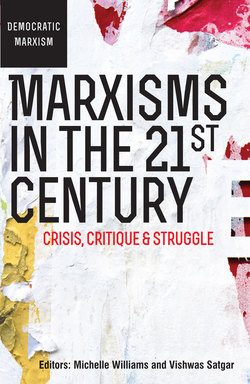Читать книгу Marxisms in the 21st Century - John Saul - Страница 22
На сайте Литреса книга снята с продажи.
Acknowledgement
ОглавлениеI would like to acknowledge the comments I have received in the many places I have given variants of this paper before its evolution into the chapter in this book. I’m especially grateful to Stephen Gelb for his thorough-going critique as a reviewer for Transformation and to Michelle Williams for encouraging me to continue despite those criticisms.
Notes
1 There have, of course, been other periodisations of Marxism, but most offer a story of collapse. Thus, George Lichteim (1961) traces the birth and rise of Marxism and then the fall after the Russian Revolution. Writing in the aftermath of the European upsurge, Perry Anderson (1976) focuses on the rise of a classical Marxism, followed by the retreat of Western Marxism into philosophy as it lost touch with its revolutionary mainspring. Leszek Kolakowski (1978) describes Marxism’s fall from grace with the rise of the Soviet Union and Western Marxism, followed by its final degeneration with the student movements of the 1960s. Note that all these classic accounts were written before the collapse of communism, whose existence was taken for granted.
2 Harvey identifies the wave of marketisation with accumulation through dispossession, a necessary accompaniment to commodification which Marx had only seen as part of the pre-history of capitalism, what he called primitive accumulation.
3 Naomi Klein (2007) offers a magnificent panorama of capitalism’s capacity to exploit the crises it generates through processes of primitive accumulation.
4 Polanyi argues that it is the extreme form of dispossession (disembedding) that leads to working-class revolt whereas later historians, most notably E.P. Thompson (1963) argue that it was the strength of tradition founded in the skilled crafts, in other words a pre-formed working class, rather than its destruction, that accounted for mounting mobilisation.
5 As regards the contradictions of the state socialist economy, see two non-Marxists: János Kornai (1992) and Alec Nove (1983).
6 I refer here to a broad genre of works that would include Louis Althusser (1969 and 1971), Ralph Miliband (1969), Nicos Poulantzas (1973) and William Appleman Williams (1961).
7 I have developed this complementary relation in Burawoy (2003).
8 In this regard Gramsci’s critique of sociology applies especially well to Polanyi’s invocation of ‘society’ as a deus ex machina. For Gramsci, society or ‘civil society’ is something that organises but is also organised by specific social and political forces.
References
Althusser, L. 1969. For Marx. London: Allen and Unwin.
Althusser, L. 1971. Lenin and Philosophy and Other Essays. London: New Left Books.
Amin, S. 1974. Accumulation on a World Scale. New York: Monthly Review Press.
Anderson, P. 1976. Considerations on Western Marxism. London: New Left Books.
Baran, P. 1957. The Political Economy of Growth. New York: Monthly Review Press.
Bernstein, E. 1961. Evolutionary Socialism. New York: Schocken Books.
Bockman, J. 2011. Markets in the Name of Socialism. Stanford: Stanford University Press.
Burawoy, M. 2003. ‘For a sociological Marxism: The complementary convergence of Antonio Gramsci and Karl Polanyi’, Politics and Society, 31 (2): 193–261.
Burawoy, M. and Wright, E.O. 2002. ‘Sociological Marxism’. In Handbook of Sociological Theory, edited by J. Turner. New York: Plenum Publishers.
Fanon, F. 1967. The Wretched of the Earth. Harmondsworth: Penguin.
Frank, A.G. 1966. Development of Underdevelopment. New York: Monthly Review Press.
Goode, P. (ed.). 1983. Karl Kautsky: Selected Political Writings. London: Macmillan.
Gramsci, A. 1971. Selections from Prison Notebooks. New York: International Publishers.
Hall, S. 1986. ‘The problem of ideology – Marxism without guarantees’, Journal of Communication Inquiry, 10 (2): 28–44.
Harvey, D. 2003. The New Imperialism. New York: Oxford University Press.
Harvey, D. 2005. A Short History of Neoliberalism. New York: Oxford University Press.
Horkheimer, M. and Adorno, T. 1972. Dialectic of Enlightenment. New York: Seabury Press.
Kautsky, K. 1971. The Class Struggle. New York: Norton.
Klein, N. 2007. The Shock Doctrine. New York: Henry Holt & Co.
Kolakowski, L. 1978. Main Currents of Marxism (three volumes). Oxford: Oxford University Press.
Kornai, J. 1992. The Socialist System. Princeton: Princeton University Press.
Lenin, V. 1963. ‘Imperialism: The highest stage of capitalism’. In Volume 1: Selected Works. New York: Progress Publishers.
Lichtheim, G. 1961. Marxism. London: Routledge and Kegan Paul.
Lukács, G. 1971. History and Class Consciousness. Cambridge, MA: MIT Press.
Luxemburg, R. 1970. ‘The mass strike, the political party and the trade unions’; ‘Reform or revolution’. In Rosa Luxemburg Speaks. New York: Pathfinder Press.
Mandel, E. 1975. Late Capitalism. London: New Left Books.
Marcuse, H. 1955. Eros and Civilization. Boston: Beacon Press.
Marcuse, H. 1958. Soviet Marxism. New York: Columbia University Press.
Marcuse, H. 1964. One Dimensional Man. Boston: Beacon Press.
Marx, K. 1967. Capital (three volumes). New York: International Publishers.
Miliband, R. 1969. The State in Capitalist Society. New York: Basic Books.
Nove, A. 1983. The Economics of Feasible Socialism. London: Allen and Unwin.
Parsons, T. 1967. ‘Some comments on the sociology of Karl Marx’. In T. Parsons, Sociological Theory and Modern Society. New York: Free Press.
Polanyi, K. 1944. The Great Transformation: The Political and Economic Origins of Our Time. Boston: Beacon Press.
Poulantzas, N. 1973. Political Power and Social Classes. London: New Left Books.
Simons, R. and Simons, J. 1969. Class and Colour in South Africa, 1850–1950. Harmondsworth: Penguin.
Sweezy, P. 1946. The Theory of Capitalist Development. New York: D. Donson.
Thompson, E.P. 1963. The Making of the English Working Class. London: Victor Gollancz.
Williams, W.A. 1961. The Contours of American History. Cleveland: World Publishing Co.
Wolpe, H. 1972. ‘Capitalism and cheap labour power in South Africa: From segregation to apartheid’, Economy and Society, 1: 425–456.
Wright, E.O. 2010. Envisioning Real Utopias. London: Verso.
